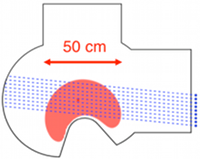TJ-II:Spectroscopy: Difference between revisions
No edit summary |
No edit summary |
||
| Line 1: | Line 1: | ||
== Multichannel system == | |||
[[Image:spectrometer-setup.png|frame|Observation geometry of the nine-channel high-resolution spectroscopic diagnostic system]] | [[Image:spectrometer-setup.png|frame|Observation geometry of the nine-channel high-resolution spectroscopic diagnostic system]] | ||
[[TJ-II]] disposes of a nine-channel, high-resolution, spectroscopic diagnostic system. This system is currently being used to measure impurity ion temperature and poloidal rotation using passive emission spectroscopy. The principal features of the diagnostic include independent focusing of its channels, high sensitivity for performing Doppler measurements in plasmas, as well as a flexible and fast in-house-developed software program for performing integrated data reduction and analysis. | [[TJ-II]] disposes of a nine-channel, high-resolution, spectroscopic diagnostic system. This system is currently being used to measure impurity ion temperature and poloidal rotation using passive emission spectroscopy. The principal features of the diagnostic include independent focusing of its channels, high sensitivity for performing Doppler measurements in plasmas, as well as a flexible and fast in-house-developed software program for performing integrated data reduction and analysis. | ||
<ref>[http://link.aip.org/link/?RSINAK/72/971/1 A. Baciero et al, ''A multi-channel spectroscopic system for measuring impurity ion temperatures and poloidal rotation velocities in TJ-II'', Rev. Sci. Instrum. '''72''' (2001) 971]</ref> | <ref>[http://link.aip.org/link/?RSINAK/72/971/1 A. Baciero et al, ''A multi-channel spectroscopic system for measuring impurity ion temperatures and poloidal rotation velocities in TJ-II'', Rev. Sci. Instrum. '''72''' (2001) 971]</ref> | ||
<ref>[http://www.new.ans.org/pubs/journals/fst/a_1264 B. Zurro et al, ''Comparison of Impurity Poloidal Rotation in ECRH and NBI Discharges of the TJ-II HELIAC'', Fusion Science and Technology '''50''', 3 (2006) 419-427]</ref>. This experimental system has been | <ref>[http://www.new.ans.org/pubs/journals/fst/a_1264 B. Zurro et al, ''Comparison of Impurity Poloidal Rotation in ECRH and NBI Discharges of the TJ-II HELIAC'', Fusion Science and Technology '''50''', 3 (2006) 419-427]</ref>. This experimental system has also been used to measure proton rotation using spectral line emission from excited fast neutrals created from inner core plasma protons via charge exchange transfer reactions. <ref>[http://link.aip.org/link/?RSINAK/74/2056/1 B. Zurro et al, ''Investigation of proton rotation measurements using hydrogen line wings in the TJ-II stellarator'', Rev. Sci. Instrum. '''74''' (2003) 2056]</ref> | ||
== Other techniques == | |||
One method for measuring absolutely calibrated toroidal rotation velocities consists of simultaneously recording the emission lines from the plasma and from a calibration lamp by means of a double fiber-fiber guide. | |||
<ref>[http://link.aip.org/link/?RSINAK/77/033506/1 D. Rapisarda et al, ''Novel passive spectroscopy system for absolutely referenced plasma rotation measurements in clean plasmas'', Rev. Sci. Instrum. '''77''' (2006) 033506]</ref> | <ref>[http://link.aip.org/link/?RSINAK/77/033506/1 D. Rapisarda et al, ''Novel passive spectroscopy system for absolutely referenced plasma rotation measurements in clean plasmas'', Rev. Sci. Instrum. '''77''' (2006) 033506]</ref> | ||
Revision as of 19:06, 3 September 2009
Multichannel system
TJ-II disposes of a nine-channel, high-resolution, spectroscopic diagnostic system. This system is currently being used to measure impurity ion temperature and poloidal rotation using passive emission spectroscopy. The principal features of the diagnostic include independent focusing of its channels, high sensitivity for performing Doppler measurements in plasmas, as well as a flexible and fast in-house-developed software program for performing integrated data reduction and analysis. [1] [2]. This experimental system has also been used to measure proton rotation using spectral line emission from excited fast neutrals created from inner core plasma protons via charge exchange transfer reactions. [3]
Other techniques
One method for measuring absolutely calibrated toroidal rotation velocities consists of simultaneously recording the emission lines from the plasma and from a calibration lamp by means of a double fiber-fiber guide. [4]
A vacuum ultraviolet spectrometer is used for performing spectral surveys and specialized plasma studies. [5] [6]
The chord-integrated emissions of spectral lines are monitored by using a spectral system with time and space scanning capabilities and relative calibration over the entire UV-visible spectral range. This system has been used to study the line ratio of lines of different ionization stages of carbon C5+ 5290 Å and C4+ 2271 Å for plasma diagnostic purposes. [7]
References
- ↑ A. Baciero et al, A multi-channel spectroscopic system for measuring impurity ion temperatures and poloidal rotation velocities in TJ-II, Rev. Sci. Instrum. 72 (2001) 971
- ↑ B. Zurro et al, Comparison of Impurity Poloidal Rotation in ECRH and NBI Discharges of the TJ-II HELIAC, Fusion Science and Technology 50, 3 (2006) 419-427
- ↑ B. Zurro et al, Investigation of proton rotation measurements using hydrogen line wings in the TJ-II stellarator, Rev. Sci. Instrum. 74 (2003) 2056
- ↑ D. Rapisarda et al, Novel passive spectroscopy system for absolutely referenced plasma rotation measurements in clean plasmas, Rev. Sci. Instrum. 77 (2006) 033506
- ↑ K.J. McCarthy et al, A toroidal focusing mirror based vacuum ultraviolet diagnostic for TJ-II, Rev. Sci. Instrum. 70 (1999) 312
- ↑ K.J. McCarthy et al, A Study of Spectral Lines in Plasmas Heated by Neutral Beam Injection in the TJ-II Stellarator, AIP Conf. Proc. 1058 (2008) 219-221
- ↑ B. Zurro et al, An experimental system for spectral line ratio measurements in the TJ-II stellarator, Rev. Sci. Instrum. 79 (2008) 10F540
